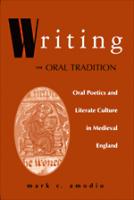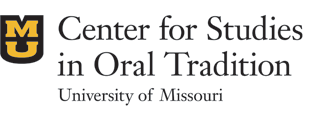Oral Poetry in Medieval England
 Released in early 2005 from the University of Notre Dame Press, Mark Amodio’s Writing the Oral Tradition tackles the complex problem of how we are to understand "literary" works that derive from oral tradition. What do we do with verbal art that lives on the cusp? What he shows is arresting: namely, that "literature penned by authors draws a great deal of its meaning from prior (and in some cases) continuing oral traditions. His book inaugurates the UNDP series on Poetics of Orality and Literacy.
Released in early 2005 from the University of Notre Dame Press, Mark Amodio’s Writing the Oral Tradition tackles the complex problem of how we are to understand "literary" works that derive from oral tradition. What do we do with verbal art that lives on the cusp? What he shows is arresting: namely, that "literature penned by authors draws a great deal of its meaning from prior (and in some cases) continuing oral traditions. His book inaugurates the UNDP series on Poetics of Orality and Literacy.
The UNDP website describes the book as follows:
Writing the Oral Tradition focuses on the influence of the oral tradition on written vernacular verse produced in England from the fifth to the fifteenth century. His primary aim is to explore how a living tradition articulated only through the public, performance voices of pre-literate singers came to find expression through the pens of private, literate authors. Amodio argues that the expressive economy of oral poetics survives in written texts because, throughout the Middle Ages, literacy and orality were interdependent, not competing, cultural forces.
After delving into the background of the medieval oral-literate matrix, Writing the Oral Tradition develops a model of non-performative oral poetics that is a central, perhaps defining, component of Old English vernacular verse. Following the Norman Conquest, oral poetics lost its central position and became one of many ways to articulate poetry. Contrary to many scholars, Amodio argues that oral poetics did not disappear but survived well into the post-Conquest period. It influenced the composition of Middle English verse texts produced from the twelfth to the fourteenth century because it offered poets an affectively powerful and economical way to articulate traditional meanings. Indeed, fragments of oral poetics are discoverable in contemporary prose, poetics, and film as they continue to faithfully emit their traditional meanings.


